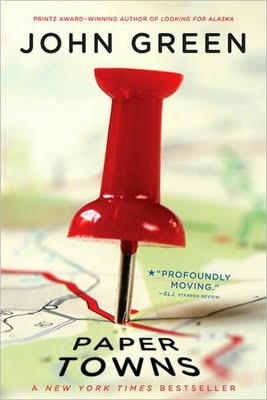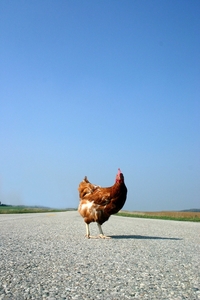A fascinating adventure
of one seemingly-courageous-but-totally-freaked-out-geek in search of a
beautiful, attractive, but totally freaked out teen rebel he’s absolutely in
love with. A captivating, intricately planned road trip complete with a lot of
weighty baggage and quirky, clever characters—this is what John Green’s Paper Towns is,
his third young adult fiction novel after Looking for Alaska and An Abundance of Katherines.
Paper Towns follows the
story of Quentin Jacobsen, also
known as Q, and his quest to find
his runaway ideal girl, Margo Roth Spiegelman,
the archetypical attractive high school queen bee at Winter Park High School in
Jefferson Park, Orlando, Florida. Margo, who’s had enough of the fake attitude
of her friends and the controlling demeanor of her parents, decides to leave Orlando,
aptly referred by her as a paper town.
“Here’s what’s not beautiful about
it: from here, you can’t see the rust or the cracked paint or whatever, but you
can tell what the place really is. You see how fake it all is. It’s not even
hard enough to be made out of plastic. It’s a paper town.” – Margo (p. 80)
On
the night before her departure, Margo takes Quentin in a joyride around
Orlando, soliciting his help in exacting revenge against all the people who
pretended to be her friend all that time. But more than a sinister payback scheme, the
joyride proved to be the start of a long and arduous baptism of fire for
Quentin, hatched by the courageous and scheming Margo.
When Margo disappears the following day, Quentin is baffled and goes on a fanatical
search for her. Examining the different clues she left behind, Q tries to dig
deeper into the Margo that he knew, but as he dug deeper, the more he realizes
he doesn’t know Margo at all. That the real Margo is very far from the Margo he
knew—smart, but reserved, damaged, and has a thing for escapism. He also learns
more about himself than Margo as he progresses through the adventure: that he
was capable of things he thought he can’t do before. This is where this
charming young adult fiction turns into a heart-warming, thoughtful
coming-of-age story.
Helped
by clever and funny friends Ben, Radar, and Lacey, they analyze each clue for
hints regarding Margo’s whereabouts. The whole process is excruciating, filled
with a multitude of setbacks, misread clues, and out-of-nowhere
disappointments. It was only when they go back to the very definition of “paper towns” that they realize what
Margo was referring to and where she was—in the real paper town of Agloe, New York, a fictional town added
to US maps to prevent copyright infringement. In the midst of this new found
information, they hastily head out on a road trip across the East Coast to
reach Margo before it was too late.
Paper
Towns is the first John Green book that I’ve read. Before that, I became
fascinated by John Green only through his YouTube vlog Crash Course: History. It
was only when my blogger friend Clarisse E. mentioned The Fault in Our Stars
that I realized that the John Green she was referring to was the same John Green
I was watching and realized that he was an author too. Hence, I embarked on a
journey to discover all things John Green.
John
Green writes in an honest (sometimes too honest) and thoughtful voice through
Quentin Jacobsen. You see an overanalyzing teen geek mushing over the sudden
disappearance of his ultimate crush when Q talks. The right mix of
sentimentality and comedy is what made the prose charming and attractive
indeed. And while the book is dominated by geeky characters, Green did a good
job of differentiating each one of them: the goofy and sometimes
out-of-the-blue action star Ben Starling,
and the ever-techie-help-a-friend-in-a-drop-of-a-hat Radar.
I
read Paper Towns at a time when I was
devastated by the sudden disappearance of someone I dearly loved, and somehow
it helped me go through the process of moving on. How after two and a half years of being with her and thinking I knew
her too well, I didn't know the real her after all. Or that I might have known the real her but time and distance had
changed her too well that what I knew of her turned out to be false already.
“When did we see each other
face-to-face? Not until you saw into my cracks and I saw into yours. Before
that, we were just looking at ideas of each other, like looking at your window
shade but never seeing inside. But once the vessel cracks, the light can get
in. The light can get out.” – Q, (p. 361)
In
Quentin’s search, we are reminded of the challenges all of us go through in our
own enigmatic road trips in life, and the bravery, cleverness, and audacity we
have to muster in order to get to our destination and bask in the glory of
having reached it. It also reminds us that ideals such as being there for our
friends, getting to know ourselves and others better, and not giving up on
people valuable to us, are still ideas worth their weight in gold.
In
the end, Paper Towns is one book that I definitely loved reading and
would like to recommend to teens and adults alike (but most importantly, to
teens), whether geek or not. And when you finish reading, read it again. Every
turn of the page is worth it.




